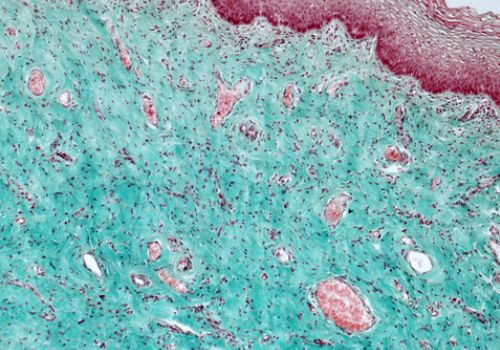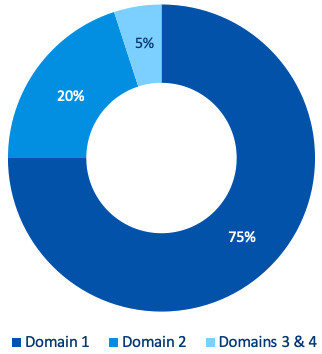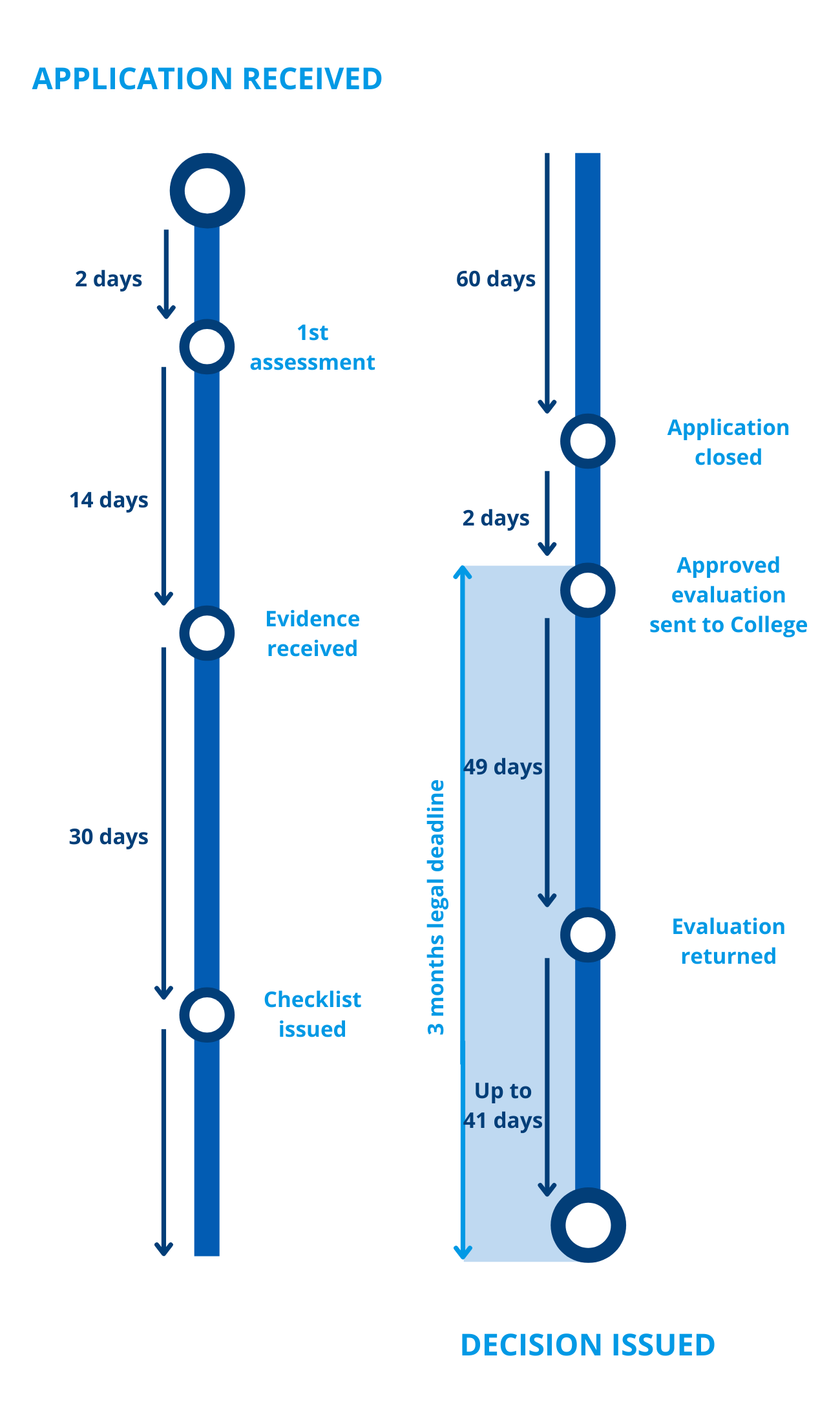CESR - a comprehensive guide for histopathologists
- April 08, 2022

IMGs from any country in the world can apply for Specialist Registration, provided certain eligibility criteria are met, though there are different routes available based on a doctor’s qualifications and training.
Here we explore specialist registration in histopathology for overseas consultant pathologists and specialists more closely. We’ll cover the Certificate of Eligibility for Specialist Registration (CESR) specifically, including the application, costs, and eligibility criteria, along with some other topics, summarised in the headings below:
- What is Specialist Registration?
- What route to Specialist Registration is best for me as an overseas pathologist?
- Do I have to complete CESR before I can work in the UK?
- Do I need FRCPath for Specialist Registration?
- What is the CESR equivalence process?
- What evidence do I need to submit for a CESR in histopathology?
- How much does CESR cost?
- How long is the CESR application process?
- #IMG Tips
- How do I get started?
Skip ahead to the relevant section if you know what you’re looking for.
Specialist Registration
Specialist registration in any specialty means that you can be appointed to a substantive (permanent) consultant position in the NHS. All physicians who wish to take permanent consultant roles in the UK must show evidence of skills, knowledge, and experience in order to gain Specialist Registration.
Specialist Registration is additional to full registration with the GMC and is therefore not required to practice as a histopathologist in the UK.
Routes to Specialist Registration
There are three types of certificates issued by the GMC for specialist registration across all specialties, and the type of certificate you receive depends on which training route you followed.

For pathologists who have completed their full training outside a GMC-approved training programme, CESR is the route they will usually take towards attaining specialist registration. This route does not require further training, but rather the submission of an application.
Doctors who have trained outside the UK or Switzerland, but within an EEA country, will be awarded CCT (Certificate of Completion of Training) after a successful specialist registration application. Specialist Certifications from across the EU are deemed as equivalent by the GMC, and therefore a straightforward application can be made.
Pathology Positions in the NHS without CESR
It is important to note that you attain more senior histopathology roles in the NHS, such as a specialty doctor (SAS), specialist grade or a locum consultant without being on the Specialist Register.
Similarly, overseas doctors do not require CESR before moving to the UK to work in the NHS.
In these NHS roles, you will have better pay and responsibilities that are more appropriate to your level of experience compared to a trainee. While working in these positions, you can collect evidence of your competences, particularly those specific to the UK histopathology curriculum.
These positions also facilitate a faster route to the UK than the CESR route, which can take a substantial amount of time.
FRCPath for Specialist Registration
Whilst it is always beneficial pathologists to complete FRCPath, overseas doctors looking to join the Specialist Register do not necessarily need to have completed the Royal College postgraduate exams.
The standard test of knowledge in the CCT curriculum are the FRCPath exams, so passing these exams confirms the attainment of the competencies of the Histopathology Curriculum.
FRCPath is only a requirement for doctors looking to attain Specialist Registration via the CCT route.
However, if CESR applicants have not successfully completed these exams, they must provide alternative evidence that demonstrates equivalent knowledge to histopathologists who have passed the FRCPath exams.
Even if the competencies covered by the exams require something that someone in your position would not routinely undertake (in your sub-specialty for example), you must still provide evidence of it – as the evaluators will not make assumptions outside the evidence presented.
CESR Equivalence Process
Equivalence describes the process of assessing an overseas applicant’s training and experience against the current histopathology training programme requirements, in order to be awarded CESR.
The equivalence process involves submitting a written body of evidence to the GMC, consisting of:
The Royal College of Pathologists will assess each application against the relevant Curriculum before providing a recommendation to the GMC, who will then make a decision.
Please note that Equivalence procedures are the responsibility of the GMC. Applications are made through their Certification Department and initial enquiries should be directed there.
Evidence Requirements for CESR in Histopathology
Skills & Experience: The evidence provided for a CESR application in histopathology must cover the knowledge, skills, and qualifications to demonstrate the required competencies in all areas of the Curriculum for Specialty Training in Histopathology. If evidence is missing from any area of the curriculum, the application may be unsuccessful.
Capabilities in Practice: The Royal College of Pathologists has divided the Training Curriculum into 11 different Capabilities in Practice (CiPs) – each comes along with its own descriptor and guidance on where such CiPs would be evidenced.
Applicants are required to gather evidence by area of competence and attach this under the relevant section of the online application.
Generic CiPs
- Able to function effectively within healthcare and other organisational and management systems to deliver consistent high-quality patient care.
- Able to work within ethical and legal frameworks across all aspects of clinical practice.
- Communicates effectively and is able to share decisionmaking, while maintaining appropriate situational awareness, professional behaviour and professional judgement.
- Maintains patient safety at the forefront of clinical working. Can utilise quality improvement activity realistically within the constraints of the role.
- Able to contribute to and support research.
- Behaves as an educator in the context of the role and promotes educational culture.
- Able to self-appraise, learn and adapt.
Histopathology-specific CiPs
- Able to demonstrate leadership and management within the laboratory setting for the benefit of patient care.
- Able to use laboratory and other services effectively in the investigation, diagnosis, and management of patients, relatives, and the deceased.
- Able to manage and contribute to a multidisciplinary team effectively.
- Able to take, manage and interpret pathological specimens accurately and safely, mindful of risks to self and others.
Audit and Governance: You are required to submit evidence of your active leadership in audit, including evidence that you have completed at least one audit cycle.
Currency of evidence: Your evaluators will be looking for evidence of current competency, generally defined as within the last five years. If you have completed training before this point, it is crucial that you provide evidence of maintaining competency across the whole area of the curriculum.
The GMC asks that only evidence that is strictly relevant is sent as it will help them to process the application quicker. The guidance on compiling your evidence will help you to decide what is relevant and what is not – you can find this on the GMC website here.
As a general guide, the GMC usually expects to see about 800-1000 pages of evidence, divided into four different domains, reflecting those of Good Medical Practice. The GMC recommends that you apportion the evidence provided as shown below:

Domain 1 - Knowledge, skills, and performance
Domain 2 – Safety and quality
Domain 3 – Communication, partnership, and teamwork
Please note, you cannot compensate for evidence lacking in one area by providing more evidence in another area.
The full list of evidence required for each domain can be found on the GMC website here.
The Cost of CESR Applications
All histopathology applying for Specialist Registration must pay a fee. For CESR, this fee is £1,676. For CESR-CP and CCT, the cost is £439.
How long does it take to complete a CESR in Histopathology application?
The GMC estimate that it can take between six and eight months to receive a decision, from the date you submit your CESR application.

As there is a substantial amount of evidence to gather for a CESR application, the process of preparing all the necessary documentation and applying for CESR can take even longer than this, and a typical candidate will usually set out to complete this within 1 – 3 years.
It is worth noting that more senior histopathologists, such as consultants, are more likely to have achieved all the competences outlined in the curriculum.
The indicative period of training for a CCT in histopathology is five years, so it is highly unlikely that you would achieve the competencies required for a CCT in a shorter period of time. Therefore, CESR is not suitable for more junior pathologists.
#IMG Tips
- Research/think about the types of evidence you will need and begin to gather your evidence well in advance of making your application.
- Gather evidence prospectively – this is much easier than retrospectively trying to pull together the evidence under additional pressures.
- Make sure that your evidence is of the highest possible quality and is current – you will be assessed against the most recent curriculum.
- Ensure that the evidence you collect demonstrates your competence across the whole of the histopathology curriculum, not just your sub-specialty.
- Remember to refer to the most up-to-date Histopathology Specialty Training Curriculum and Specialty Specific Guidance for the evidence requirements in your specialty.
- Create a CESR ‘to-do list’ with sections under the 11 CiPs headings – organise your evidence directly into these sections to manage your progress.
- Do not submit original documents – all your copies, other than qualifications you’re getting authenticated must be accompanied by a proformas signed by the person who is attesting to the validity and accuracy of your evidence (your verifier).
- Ask an IMG Connect recruitment specialist about NHS histopathology posts with CESR support. These are not always advertised by the Trusts, but we can help you find a role which aligns well with your career goals in the NHS.
- Join the IMG Histopathologists community – as well as support on Royal College exams, our online community of international pathologists and dedicated pathology recruiters offers guidance on other aspects of working in the UK, including finding NHS posts and CESR.
Getting started
Many pathology IMGs likely haven’t completed a UK-approved training programme, but you could be eligible for Specialist Registration with the GMC via the CESR route. Take a look at our guide to CESR Applications for Histopathology for more information on how to apply and what to expect.
If you have any further questions about Specialist Registration, your route to the UK, or would like guidance in finding NHS histopathology posts which offer CESR support, please get in touch with us here.
Follow us on social media through the links below for regular news and updates on the Royal Colleges, relocating to the UK and working in the NHS:
Relevant Jobs
JOB REQUIREMENTS AND DETAILS
- FRCPath or equivalent and Full GMC Registration are required.
- The salary will be competitive and dependent on experience.
CORE DUTIES OF THIS ROLE
- Provide histopathology services for diagnostics.
- Participate in the Bowel Cancer Screening Programme.
- Collaborate in academic and educational activities.
- Contribute to digital Histopathology system development.
LIFE IN THE REGION
The position is based in a city offering a mix of urban amenities and scenic rural living options. Families will find excellent schools, easy access to transport, and a range of leisure activities. The region has a rich cultural and historical significance.
This exceptional opportunity beckons Consultant Histopathologists specializing in Gynae oncopathology to become integral members of an NHS Trust that is a global beacon in cancer research and treatment. This role offers a chance to contribute to a consultant-led, subspecialist histopathology team, making a significant impact on the forefront of cancer care. We invite enthusiastic candidates to explore this exciting career prospect through NHS Jobs in the UK.
The NHS Foundation Trust, standing as Europe\'s largest comprehensive cancer center, commands an impressive annual budget of £360 million, employing over 3,500 staff, including 335 medical professionals. Acknowledged for its excellence, the Trust consistently ranks among the top four in national surveys, affirming its commitment to delivering high-quality patient care. The Histopathology Department, under the leadership of esteemed professionals, manages a substantial caseload, processing around 21,000 surgical pathology accessions annually. This involves the examination of approximately 280,000 slides, with a notable 1,000 cases annually seeking second opinions, underscoring the department\'s dedication to providing comprehensive diagnostic support.
This role is tailor-made for ambitious consultants looking to expand their career horizons. The well-funded department is a hub for impactful research, underscored by its recognition in a recent CQC report as an area of outstanding practice. The NHS Foundation Trust has a strong reputation for education and training, supporting junior doctor training programs across various specialties.
Living in London, a vibrant metropolis, provides a unique lifestyle enriched by cultural diversity. Residents can explore scenic spots like Hyde Park and the Thames River. World-renowned schools, including Imperial College London and University College London, contribute to the city\'s intellectual vibrancy. Excellent transport links facilitate easy travel within the city and to major cities and airports. Housing options, ranging from historic townhouses to modern apartments, accommodate diverse preferences, ensuring a comfortable and enriching life for medical professionals in the heart of London.
Apply now for a dynamic career at the forefront of cancer care, complemented by the vibrant and diverse urban lifestyle offered by the capital city.
AM I ELIGIBLE FOR THIS ROLE?
Non-EEA candidates:
- FRCPath
- Experience in Histopathology (sub specialised in Gynae oncopathology)
EEA candidates:
- Specialist certification in Histopathology
- Experience in Histopathology (sub specailised in Gynae oncopathology)
UK candidates:
- CCT, CESR or within 6-12 months of specialist registration
- Experience in Histopathology (sub specialised in Gynae oncopathology)
Eligibility for these roles:
- Specialist Registration in Histopathology with the GMC - this is essential and candidates cannot be considered without this.
- Strong experience reporting histology in cardiothoracic pathology
A leading NHS hospital in South West England is looking for a Consultant in Histopathology with an interest in general histopathology and non-gynae cytology, with opportunities to develop a special interest. The Histopathology department consists of a team of highly experienced consultants, supported by middle-grade doctors. This Histopathology job is open to both international and UK-based applicants, though only those with eligible for specialist registration can be considered.
JOB REQUIREMENTS AND DETAILS
CESR submission, a European specialist qualification, or CCT within 6 months of interview (or international equivalent) with experience in general histopathology and non-gynae cytology are required for this role, and The salary will be between the standard NHS Consultant pay scale, with salary dependent on experience or grade.
CORE DUTIES OF THIS ROLE
- Provide high-quality histopathology and non-gynae cytology diagnostics.
- Participate in MDT meetings and offer expert histopathological opinions.
- Engage in teaching and mentorship of junior doctors and medical students.
- Contribute to audit, governance, and quality assurance initiatives.
LIFE IN SOUTH WEST ENGLAND
This hospital is located in a thriving town in South West England, offering urban living with access to quieter rural surroundings. The region provides excellent schools, strong transport links to major cities, and a variety of recreational activities, including beaches, national parks, and cultural festivals.
Historically, the area is known for its medieval landmarks, natural beauty, and rich cultural heritage, making it an excellent location for both professional and personal life.
HOW WILL IMG CONNECT SUPPORT YOU?
When applying with IMG Connect you’ll have the full support of an expert recruitment team who will be your recruitment and relocation partners throughout the process. We\'ll support you with:
- CV Preparation with a bespoke session with one of our specialists
- Application support with expert knowledge of NHS specialisms & recruitment practice
- At least two video calling interview preparation sessions
- Contract and offer negotiations for salary, relocation packages, tenure, and more
Once you have accepted your new role, you’ll then be supported and led throughout by one of our dedicated relocation executives who will guide you through all the way to starting your new role, including:
- Document gathering and checking
- COS and Visa Application support if applicable
- Support sourcing short- and long-term accommodation
- Travel Arrangements
- Family support for finding schools and any other aspects of pastoral care
Cellular Pathology Services
The Cellular and Anatomical Pathology Department encompasses histopathology, cytopathology, neuropathology, and anatomical pathology. Annually, it processes approximately 38,000 surgical biopsies, 2,000 non-cervical cytology samples, and conducts around 1,100 postmortem examinations.
The department is staffed by a multidisciplinary team, including consultant pathologists, biomedical scientists, and technical specialists. Services provided involve diagnostic evaluations of tissue samples to identify diseases such as cancer and precancerous conditions, utilizing techniques like special stains, immunocytochemistry, electron microscopy, and molecular methods. The department\'s facilities are equipped to deliver timely and accurate diagnoses, with most straightforward biopsies reported within 14 working days.
Eligibility
Working arrangements can be discussed openly, with an understanding that flexible working and full off-site reporting is accepted and offered for those requiring so, and with specialist registration NHS consultant experience are invited to apply.



